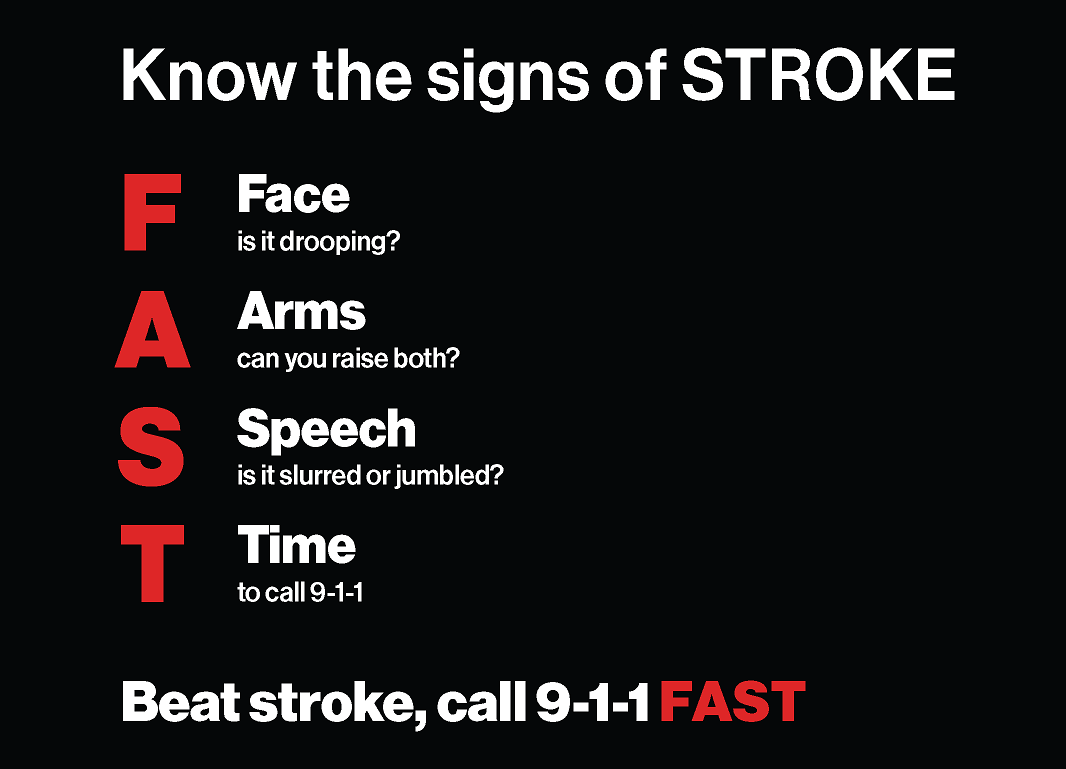What is a stroke? A stroke is a disruption of blood supply to the brain – either through a blockage due to clot (ischemic), or bleeding (hemorrhagic).
Stroke is the number one cause of adult disability and the third leading cause of death in the country. According to the
World Stroke Campaign, 80 million people worldwide have had a stroke and 50 million stroke survivors live with some form of permanent disability. Sunday, Oct. 29 is World Stroke Day, held annually to help remind survivors that they are not alone.
“A stroke can impact all aspects of a person’s life – not only their physical abilities, but also speech, cognition, vision and emotions, resulting in debilitating psychological, social and financial problems,” says Sacha Arsenault, provincial director, Stroke Services BC (SSBC). “To optimize outcomes for patients and families, SSBC is part of the global effort to improve stroke prevention, treatment, rehabilitation and support.”
“We are fortunate to have a dedicated network of stroke leaders across the province working together.” – Sacha Arsenault, SSBC
Stroke Services BC works with regional health authorities, BC Emergency Health Services, primary care, the Ministry of Health and community-based partner organizations such as Heart and Stroke and After Stroke BC, as well as people with lived experience.
Every 5 minutes, someone has a stroke in Canada. However, with early treatment and intervention, chances of recovery for people who experience a stroke are getting higher.
In B.C. alone, over 9,000 patients are hospitalized with stroke or transient ischemic attack (TIA) every year.
“Rehabilitation should start as soon as possible following a stroke,” says Dr. Andrew Dawson, program medical director, Fraser Health Rehabilitation. “Early and appropriate rehabilitation can improve function and help the survivor regain as much independence as possible over time.”
Signs of a stroke
The Heart & Stroke Foundation of Canada's
FAST campaign is an easy reminder of when to call for help:
-
Face: Is it drooping?
-
Arms: Can you raise both over your head?
-
Speech: Is it slurred or jumbled?
-
Time: Call 911 right away.
 FAST graphic courtesy of the Heart and Stroke Foundation of Canada.
FAST graphic courtesy of the Heart and Stroke Foundation of Canada.
If you or someone around you experiences any of these signs, call 9-1-1 immediately. Do not drive to the hospital; an ambulance will get you to the best hospital for stroke care. Quick treatment helps limit damage and increases the chance of full recovery. One-third of stroke patients in Canada wait too long for help and with stroke, brain damage begins in minutes.
Reduce your risk
While 90 per cent of Canadians have at least one risk factor for stroke, the good news is that 80 per cent of strokes are preventable by making healthy choices. Some risk factors like age, gender, family history and ethnicity are out of your control, but you can do the following:
-
Lower your blood pressure: High blood pressure is the number one cause of stroke. High blood pressure is often called the silent killer because it has no symptoms. Get checked regularly and know your numbers.
-
Be smoke-free: Smokers have double the stroke risk of non-smokers. But a person who quits will have the same risk as someone who never smoked within five years.
-
Get active & stay active
-
Eat a balanced diet
-
Maintain a healthy weight
-
Limit alcohol
For more information
Stroke Services BC provides a number of resources for stroke recovery patients. The links below are provided by expert organizations, which can assist in the recovery:
For health-care providers, Stroke Services BC and Health Quality BC have shared a
Stroke Quality Standard for B.C.'s health-care system that focuses on improving stroke care.

